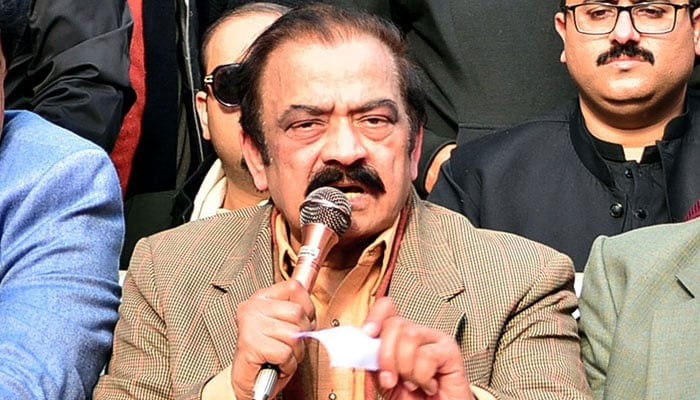‘Ruling coalition secures two-thirds majority in Parliament’
Government parties now expect from ECP to issue notification for restoration of membership of national and provincial assemblies
ISLAMABAD: The government claims that recent amendments in election laws pave the way for the ruling coalition securing two-thirds majority in the parliament.
Rana Sanaullah, Adviser to the Prime Minister on Political Affairs, when approached told The News that after the recent amendments to the election laws, the coalition parties are set to secure 2/3 majority in Parliament. He said that this will be formally done once the notification is issued by the Election Commission of Pakistan (ECP).
Rana Sanullah, however, insisted that the ECP is bound to act as per law and the constitution. Following the Supreme Court’s decision in SIC (Sunni Ittehad Council) case, the ECP through a notification had suspended the membership of those ruling coalition parties MNAs and MPAs, who were elected against special seats for women and minorities on the basis of ECP’s earlier decision that SIC was not eligible to get any share in special seats quota.
In the backdrop of the recent legislation, the government parties now expect from the ECP to issue notification for the restoration of the membership of the national and provincial assemblies, whose victory notifications were suspended following the SC’s decision.
Rana Sanaullah argued that Parliament can legislate against any Supreme Court judgment and there is nothing in the law or the constitution to bar the legislature from doing so. Parliament, he said, cannot legislate anything against the Constitution or Sharia.
The PM’s adviser said that implementation of the SC’s decision means suspending certain articles of the constitution including Article 51 and 106. Such an order cannot be implemented, he said, adding that the recent legislation by Parliament explains the legal position in the light of the constitution. The ECP, he emphasised, is now bound to act as per the amended law and the constitution.
If the ruling coalition political parties regain 2/3 majority in Parliament then it will be able to make any amendment to the constitution. There have been media reports about the government’s intention to extend the tenure of incumbent Chief Justice.
However, Law Minister Azam Nazir Tarar had told the media that there was a proposal under consideration for raising the retirement age of all civil servants. He had said that Chief Justice Qazi Faez Isa was not interested in getting an extension. Government ministers have been talking vaguely on the issue but if the retirement age is increased in the case of civil servants and judges, it would not mean extension to any particular person.
In the case of government servants, the retirement age can be increased by way of simple legislation or through policy change by an executive order. However, in order to increase the retirement age of Supreme Court and High Court judges, the constitution has to be amended and that will be possible only with the support of a 2/3 majority of Parliament.
-
 Jonathan Majors Set To Make Explosive Comeback To Acting After 2023 Conviction
Jonathan Majors Set To Make Explosive Comeback To Acting After 2023 Conviction -
 Next James Bond: Why Jacob Elordi May Never Get 007 Role?
Next James Bond: Why Jacob Elordi May Never Get 007 Role? -
 Maddox Drops Pitt From Surname In Credits Of Angelina Jolie’s New Film 'Couture' Despite Truce From Father's End In Legal Battle
Maddox Drops Pitt From Surname In Credits Of Angelina Jolie’s New Film 'Couture' Despite Truce From Father's End In Legal Battle -
 Burger King Launches AI Chatbot To Track Employee Politeness
Burger King Launches AI Chatbot To Track Employee Politeness -
 Andrew’s Woes Amid King Charles’ Cancer Battle Triggers Harry Into Action For ‘stiff Upper Lip’ Type Dad
Andrew’s Woes Amid King Charles’ Cancer Battle Triggers Harry Into Action For ‘stiff Upper Lip’ Type Dad -
 Experts Warn Andrew’s Legal Troubles In UK Could Be Far From Over
Experts Warn Andrew’s Legal Troubles In UK Could Be Far From Over -
 Teyana Taylor Reflects On Dreams Turning Into Reality Amid Major Score
Teyana Taylor Reflects On Dreams Turning Into Reality Amid Major Score -
 Jennifer Garner Drops Parenting Truth Bomb On Teens With Kylie Kelce: 'They're Amazing'
Jennifer Garner Drops Parenting Truth Bomb On Teens With Kylie Kelce: 'They're Amazing' -
 AI Is Creating More Security Problems Than It Solves, Report Warns
AI Is Creating More Security Problems Than It Solves, Report Warns -
 'Game Of Thrones' Prequel 'A Knight Of The Seven Kingdoms' New Ratings Mark Huge Milestone
'Game Of Thrones' Prequel 'A Knight Of The Seven Kingdoms' New Ratings Mark Huge Milestone -
 Apple Seeks To Dismiss Fraud Suit Over Siri AI, Epic Injunction
Apple Seeks To Dismiss Fraud Suit Over Siri AI, Epic Injunction -
 Delroy Lindo Explains The Crucial Role Of Musical Arts In Setting Up His Career Trajectory
Delroy Lindo Explains The Crucial Role Of Musical Arts In Setting Up His Career Trajectory -
 Timothée Chalamet Reveals How He Manages To Choose The Best Roles For Himself
Timothée Chalamet Reveals How He Manages To Choose The Best Roles For Himself -
 Princesses Beatrice, Eugenie’s Conflict Gets Exposed As Mom Fergie Takes Over The Media
Princesses Beatrice, Eugenie’s Conflict Gets Exposed As Mom Fergie Takes Over The Media -
 Kate Middleton Plays Rock-paper-scissors In The Rain
Kate Middleton Plays Rock-paper-scissors In The Rain -
 Lindsay Lohan On 'confusing' Teen Fame After 'Mean Girls': 'I Should Have Listened To My Mom And Dad'
Lindsay Lohan On 'confusing' Teen Fame After 'Mean Girls': 'I Should Have Listened To My Mom And Dad'




